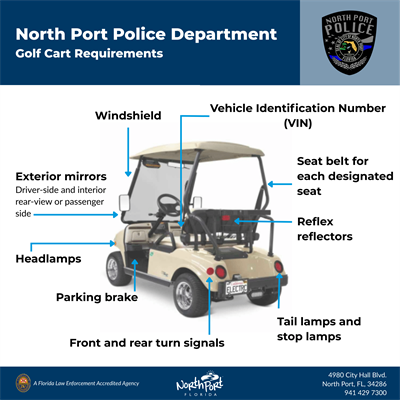Golf Cart Requirements
Golf carts are defined in section 320.01(22), Florida Statutes, as “a motor vehicle that is designed and manufactured for operation on a golf course for sporting or recreational purposes and that is not capable of exceeding speeds of 20 miles per hour.” Golf carts may be operated on roadways that are designated for golf carts with a posted speed limit of 30 mph or less. Golf carts may also cross a portion of a county road which intersects a roadway that is approved for golf carts, or that intersects a golf course or mobile home park. In both examples the roadway should have signs posted that golf carts share the roadway. The operation of golf carts on roads must comply with any more restrictive ordinances enacted by local government and should be verified prior to operating these vehicles.
The North Port City Commission has determined that golf carts may safely travel on or cross the public roads or streets identified in Section 74-152(b) of the Code of the City of North Port, Florida, as set forth in Section 2.01 of the ordinance. The operation of a golf cart is only authorized on designated city roadways where appropriate signage is posted in compliance with F.S. § 316.212(1). City Commission designated the following roadways:
- All city roads in Holiday Park Recreational District;
- All city roads in Lakeside Plantation Community Development District; and
- Plantation Boulevard.
Golf carts are not required to be titled or registered and, therefore, are not required to be insured with PIP and PDL insurance coverage.
A golf cart may not be operated on public roads or streets by a person who is under 18 years of age unless he or she possesses a valid learner’s driver license or a valid driver license. If you are over 18 years of age or older you can drive a golf cart with a valid form of government-issued photographic identification.
Section 320.01(41), Florida Statutes, defines LSVs as “any four-wheeled vehicle whose top speed is greater than 20 miles per hour, but not greater than 25 miles per hour.” LSVs must be registered, titled and insured with personal injury protection (PIP) and property damage liability (PDL) insurance. Any person operating an LSV must have a valid driver license in their immediate possession.
LSVs may be operated only on streets where the posted speed limit is 35 MPH or less and must be equipped with the following safety equipment:
- Headlamps;
- Front and rear turn signals;
- Stop lamps;
- Tail lamps;
- Reflex reflectors, red – one each side and one on the rear;
- Exterior mirror on the driver side and an interior rear-view mirror or exterior mirror on passenger side;
- Parking brake;
- Windshield;
- Seat belt for each designated seat; and a
- Vehicle identification number (VIN).
In the interest of safety, low-speed vehicles are prohibited on the following City roadways regardless of the posted speed limit:
Atwater Drive; Biscayne Drive; Chamberlain Boulevard; Cranberry Boulevard; Haberland Boulevard; Pan American Boulevard; Panacea Boulevard; Price Boulevard; Salford Boulevard; San Mateo Drive; Sumter Boulevard; and Toledo Blade Boulevard.
